During a group interview on the set of Riddick, writer-director David Twohy explained that even though this is the third film in the franchise, you don't need to have seen Pitch Black or The Chronicles of Riddick:
"Certainly it does play in a gratifying way as a standalone movie, but there are threads that we continue to sew into the fabric of this movie as well, that we started sewing in previous movies and will continue to sew in future movies. It is kind of a standalone movie, but if you came to it fresh you would probably be perplexed by a couple of the beats. But I'd rather have them interested, either perplexed and interested rather than over-explaining everything, we're not into over-explaining our things."
He also talked about the economic realities of Riddick and what they hope to do in future sequels, the visual effects, how this installment is "about one man surviving a planet and his only way to get off that planet is to call in the mercenaries to get a ride off that planet," how they have a tight shooting schedule compared to the other films, the cast, and so much more. Hit the jump for what he had to say.
Before going any further, if you haven't yet seen the trailer, I'd watch that first:
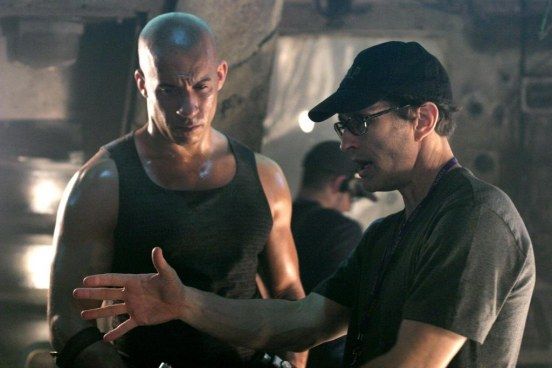
Question: This is a project that Vin [Diesel] has talked about for a long time and you've talked about–
DAVID TWOHY: I chip in occasionally.
I think a lot of us were sort of like is it ever going to finally happen? And here we are on the set of the movie, so for you can you sort of talk about finally being back in this world and–
TWOHY: The process getting here or just being back here, what it feels like?
What it means to be back here and also making the third in the franchise.
TWOHY: It feels like we are taking care of business, business that we always knew we would get back to but weren't sure when. So very — always had a pretty firm belief we'd be back here. The only time really I had shaken confidence was probably three months ago when we started here in Montreal, ran out of preproduction money and the guy who ran the other studio that we were going to film at in Montreal locked the door on us, locked us out and we went down. We got a little press for going down — negative press for going down. But it truly was just lawyers not getting their paperwork signed and when the paperwork signed the bank loan cleared and the money started flowing again and here we are making a movie, so very little doubts.
There were episodes of frustration along the way and that was the most recent one and probably the biggest one we had, when we started, stopped, got kicked out of the studio and then had to regroup and start again. But despite that here we are back from the dead and it's been how many years since the last one? Released in 2004.
Eight or nine.
TWOHY: Well, released in 2004, Chronicles, so here we are eight years later.
Can you talk about why it's taken so long because it does seem like every year there is rumors it's going to start this year, it's going to start this year?
TWOHY: Look, had I known that it was going to take so long you know, I was like — well you always expect it to be happening the next year. Anyway, probably about five years ago, Vin and I started talking seriously about doing it because there was the Chronicles of it all, which was a PG-13 movie wherein we spent a lot of money, made it — it was made as a studio movie with a lot of studio input. It pleased some fans but not all fans, certainly. It was a very different movie than Pitch Black. We recognize that and that was the aspiration at the time.
We possibly suffered from overreach, but you know what? To come up short when you reach too far is not such a bad thing rather than not to reach at all, right? So, that was my guiding motto of Chronicles. Between the new economics of the film business and where we had landed financially with the last movie about how it did relative to its budget, the new reality for us was that we could spend somewhere between 30 and 40 million dollars to make this movie. And that's kind of the ballpark we're in, roughly 40 million dollars.
When you were writing this script were you like, “How can I make this script accessible to people who may not be familiar with Chronicles or Pitch Black?” Because it's been several years since either of those films.
TWOHY: No, we're not too concerned about that. We’re concerned with just paying off the loyal fans and we think that if somebody doesn't understand something in this movie the solution is to go back and look at the other two movies and get up to speed. But certainly it does play in a gratifying way as a standalone movie, but there are threads that we continue to sew into the fabric of this movie as well, that we started sewing in previous movies and will continue to sew in future movies. It is kind of a standalone movie, but if you came to it fresh you would probably be perplexed by a couple of the beats, a few of the beats, sure. But I'd rather have them interested, either perplexed and interested rather than over-explaining everything, we're not into over-explaining our things. We're just trying to elegantly sew them together over a very long format.
I remember when the last movie came out, Vin made it a point to say that Pitch Black was like the Hobbit and that he had three — like a trilogy of Chronicles movies planned. How did the economic realities change that initial plan for those three movies?
TWOHY: Not much because the plan now is two more.
Two after this or two including?
TWOHY: Two after this.
And in terms of the budget that you–
TWOHY: And that's planned meaning, as Vin and I ballpark it out and saying, “Look how many stories can we tell with this character before we run out of steam and always have an escalation of interest?” So, we've dealt out two more movies and that is the goal at this point for us.
The ballpark that you outlined budget-wise would suggest that in scale it’s probably closer to Pitch Black than to Chronicles. Tonally, where do you feel it falls in between those two?
TWOHY: More like Pitch Black because it’s clearly R-rated as Pitch Black was. Yeah, we're not pulling any punches this time. You're sort of forced to, when you're doing a studio movie for 100 million dollars or more, you have to pull your punches because there is too many people, too much input, too many people trying to turn it into something else, too many people who don't want to take chances. So all that softens your blows and we don't want to soften our blows anymore.
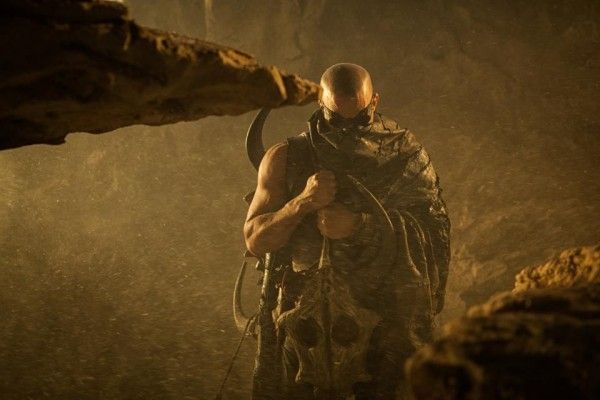
The entire
Chronicles universe encompasses a lot more than just the live action movies. You guys have had the animated films and you've been involved with the video games that were really great. I'm curious, are you planning to do that then with everything moving forward, with this movie and on, are we going to see more games?
TWOHY: Yeah, there is another game in the works. It deals with the ‘merc’ world — mercenary world. We're trying to expand that via the game system as well.
Are you having a role in all those too, like writing and things like that? I know you've been really active with all the other.
TWOHY: I know, but the answer is no. I'm just consulting on that. Vin has a game company called Tigon and they are more directly responsible for that, but we just set it in motion. I helped set it in motion and then turn it over.
I have a tech question for you. I noticed you filmed with ARRI Alexa and it looks like you're doing scope.
TWOHY: Yeah, shooting 240, yeah.
Could you sort of talk about why you chose that camera?
TWOHY: Well I have probably 850-900 visual effects shots and then, when you just look at your post-pipeline and you see what it takes to shoot film, convert it to digital, then re-add it on film for 900 shots, it becomes a very burdensome process. So the ARRI Alexa is the best digital camera to date — 14 stops of exposure latitude and that rivals film. Kodak used to say we have 12 stops of latitude and then the digital camera started claiming 13–14 and now Kodak is saying, “Well, we have 14 stops of latitude.” Anyway, the point is, it's the best digital camera in the world today, in this moment in time, and it helps streamline my digital workflow. That's why I chose the Alexa.
If I can do a follow-up, I noticed that a lot of filmmakers using digital cameras will use an old 70’s lens or some old stuff like that. Are you doing that? And also, the digital camera allows you to shoot in very low light and I wanted to know if you're going to be sort of trying to use that, because we saw a little filming yesterday with low light trying to catch shadows.
TWOHY: Shadow play, yeah. The answer to the first one is no, the second one yes. I know what you're talking about. The idea about taking the edge off digital with some older funky lenses — even anamorphic lenses, which are burnished lenses — is appealing and I really wanted to do it myself but ultimately there weren't enough lenses for first unit and second unit available — other technical issues as well. But if you light it right and if you take it through a creative DI process where you can soften the image as well — look, we can even put a film grain pass on a digital movie and you would not know the difference. Vin had the same concern, he wanted to shoot film, film, film and I said, “Look, trust me, I can make this look like film if that's the goal, really. By the time in post production, final DI, I put a film grain pass in there just to give you that little burnished feel. You would never know, but now I have all the convenience of digital. That's why we chose the ARRI Alexa.
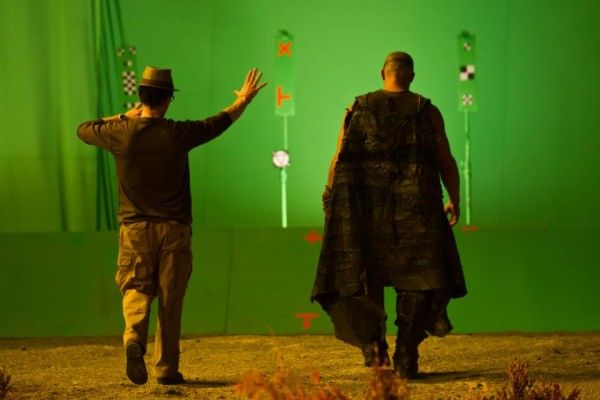
When you conceived doing
Pitch Black for the first time, was this something like, you wanted to make a horror film?
TWOHY: Yeah, was Pitch Black a horror film? I'll give you a little history that will answer the question. Remember, not my original screenplay — the original screenplay for Pitch Black was called Nightfall and was written by Ken and Jim Wheat. Interscope brought it to me and said, “Hey, there is something here about an eclipse and bad things happen during the eclipse. It's not right, can you make it right? And if you can make it right, then you can direct it.” So I said, “Great.” Introduced the character of Riddick at that point in my screenplay and we were off and running. What was the question?
I was wondering what sort of horror elements were you trying to include or is it–
TWOHY: Part of the charge was, “And it's got to be a horror movie,” because it's Pitch Black now. That was my charge that they wanted me to do and I said, “Okay. Yeah, I will give you enough horror elements to sell as a horror movie, Pitch Black. But I'm also going to try to give you something that you don't normally see in a genre project.” Which is, characters that evolve, just not stock characters, but put some what-you-think are stock characters in place: John — the square-jawed lawman, Riddick — the heartless killer, Fry — the innocent captain, and twist them all so that they become different things over the course of the story and they have secrets.
So, by the time you do all that and have these characters evolve and have Riddick turn into the most feared of them — must lead them out of this. John is the lawman who turns into like a morphine addict before your eyes and a guy who is willing to kill a child to save his own life. So it's like, okay, well those aren't really genre beats. Those are something else — that's like, drama. Those are the kinds of things that I knew I could put into a horror piece and was hopefully successful in Pitch Black.
How do you think Riddick has evolved since the last movie or even the first movie? What are you seeing about him in this movie?
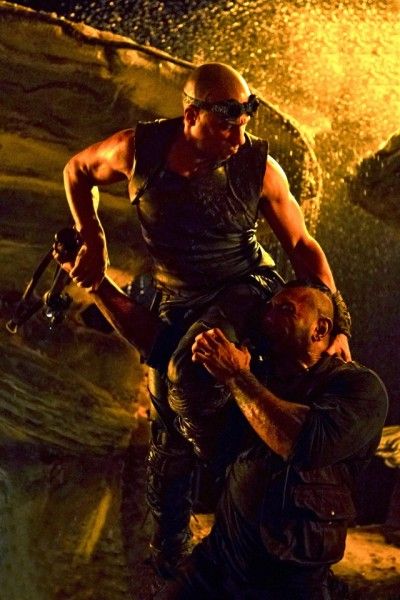 TWOHY: It's an interesting question, maybe a difficult question, in that Riddick is sort of an elemental figure and so the question is, “How much do you want to evolve an elemental figure?” You do want to make discoveries about him and that's what we are slowly doing, as he sort of discovers who he is himself and what it means to be a Furyan. I'll take it up to that point and then you can ask Vin about what it is to be a Furyan.
TWOHY: It's an interesting question, maybe a difficult question, in that Riddick is sort of an elemental figure and so the question is, “How much do you want to evolve an elemental figure?” You do want to make discoveries about him and that's what we are slowly doing, as he sort of discovers who he is himself and what it means to be a Furyan. I'll take it up to that point and then you can ask Vin about what it is to be a Furyan.
So we know that Karl Urban’s character, Vaako is back. How big a role do you connect to all this and that mythology that you established in the second film? How big a part is that in this third film?
TWOHY: Well, at its core, this next movie is a survival story about one man surviving a planet and his only way to get off that planet is to call in the mercenaries to get a ride off that planet. The short version of that is that it is a Jeremiah Johnson-like survival story, but with Riddick at the heart of it. That said, we don't turn our backs on the mythology that we planted in the last movie and we actually are bringing Karl back for a few days of filming next week to try to advance it and try to lay the groundwork for movie four. I just saw some of the Necromonger babes in costume in there and they look fantastic, in and out of their clothing and so — and they will be out of their clothing as well. Did you see some of them?
No, they took us out to dinner instead. We saw the costumes though.
TWOHY: I saw the costumes on them.
They're very S&M.
TWOHY: I guess that's a good short end.
The ones with the hands bound behind their backs.
TWOHY: The binding costumes, yeah. The metallic binding costumes, yeah.
Chronologically, how far after Chronicles of Riddick is this starting up?
TWOHY: Those are questions that we don't like to answer. Similarly, it's like, “What year is this happening? How far in the future are we?” I just don't even answer those questions because it can only fuck you up. It's like, Star Trek goes on record and says, “Here's our bible, we're 220 years in the future,” whatever Star Trek is. But it's like, you know what, did Ridley answer that question for Alien, really? You know, how many years in the future is it?
He did it recently with that TED conference. You know what I'm talking about.
TWOHY: He went on record?
Well he had the character–
TWOHY: But during the movie Alien, did you know what year you were in?
No.
TWOHY: Yeah and then the funny thing about it — and I know Ridley a bit, he's kind of, I won't say a mentor, but he is somebody whose work I study. And in Alien, there is a curious blend of technology because here you have spaceships and everything, but then he's got magazines just lying around and then Harry Dean Stanton — is that the actors name? — he's just wearing a Hawaiian shirt around a spaceship. Somebody else is just wearing greasy coveralls, so–
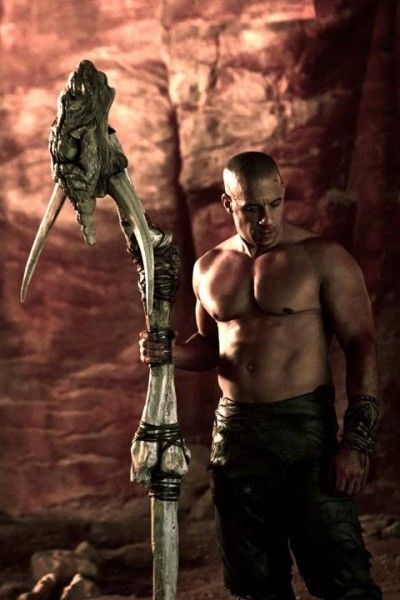
Truckers.
TWOHY: Truckers, yeah. And when Ash tried to kill Ripley he just rolls up that magazine and tried to stuff it down her throat. It's like a magazine, really? 200 years in the future, 300 years in the future really, you guys are still cutting down trees? I took that as a sign that you could blend these technologies and blend the styles and looks and that's what I sort of did in Pitch Black, a shotgun was pretty much a shotgun and you can — like we're wearing Levis today, they look pretty much like the Levis people were wearing 120 years ago. So, sometimes you can really advance technology in spurts and fits and other times it feels very familiar. In all my science fiction movies, I try to blend the familiar with the futuristic so as not to be too off putting to the audience. There is always something familiar they can grab onto.
It's interesting to hear you talk about genre films like that. I know Vin is a big Dungeons and Dragons guy and you seem very passionate about the genre, but I want to know, what is it kind of from your past that drew you to science fiction and also what makes you so passionate about this franchise that you would want to continue it even in a stripped down version.
TWOHY: Well we wanted to continue it first and foremost not just out of — it's a pride thing, sure, but it's also because we do hear from the fans. I've been involved in some pretty big movies, The Fugitive and whatnot but when I hear from the fans it's about Riddick and those movies, and wanting more. Then Vin’s got that big ass Facebook page and when he polls them it comes up Riddick for him too. When he says things like — very leading questions like, "What would you like to see me in next, Triple X or another film?" They like their Fast, but I think there is hardcore fan base for Riddick too. He knows that too. As much as anything it is a response to the fans and they have not shut up after nine years.
What drew you to the genre?
TWOHY: Initially?
Yeah.
TWOHY: You know, just because as a writer/director it is a big canvas for me to paint on — no rules and regulations. You do a drama and you are limited by the rules of reality and in science fiction you create your own reality. Some people find that daunting, I find it challenging. It's just a big ass canvas to work on.
This film, tonally and visually, seems to be quite different from the second film, which in turn was quite different from the first. Are you deliberately trying to give each of these films their own signature, their own identity so that it's really not going to be more of the same?
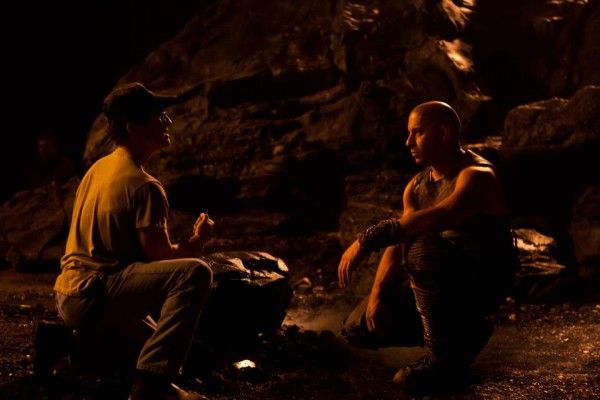 TWOHY: The answer is yes and we talked about making the next movie, blowing the next movie out a bit and really going for it and making it the battle of Underverse and just really fucking going crazy with it. It would demand more — this movie would have to be successful. It would demand a greater budget, but that's a distinct possibility for movie number four. So yes, the idea that you can go from a small movie to a large movie to a small movie and then let the fans decide whether, “You know what? I like one, three and five better than two and four,” “Are you kidding me? I like the sweep of two and four.” We actually like that and we can't think of another franchise that will do that, sort of talk about okay, this is one of their more intimate films, here is a big blow out film. We kind of like that duplicity.
TWOHY: The answer is yes and we talked about making the next movie, blowing the next movie out a bit and really going for it and making it the battle of Underverse and just really fucking going crazy with it. It would demand more — this movie would have to be successful. It would demand a greater budget, but that's a distinct possibility for movie number four. So yes, the idea that you can go from a small movie to a large movie to a small movie and then let the fans decide whether, “You know what? I like one, three and five better than two and four,” “Are you kidding me? I like the sweep of two and four.” We actually like that and we can't think of another franchise that will do that, sort of talk about okay, this is one of their more intimate films, here is a big blow out film. We kind of like that duplicity.
The last film ends in a very cool way and we've spoken to a lot of the actors who say that they come in at the end of the first act, beginning of second act, of this film. So we haven't really discovered too much about the first act and that's what I think a lot of us have been sort of curious about is–
TWOHY: How it stitches together?
Yeah, a little bit.
TWOHY: So the question is, how does it tie in with the other movies? The last movie?
Well a little bit, but we've learned a lot about the threads that are going to be placed here and there — there are some flashback sequences, a few things have been illuminated to us. But basically, the first act of this movie is still a little bit of a mystery and we're trying to put that one together.
TWOHY: Yeah, and we'll leave it a bit of a mystery I think too. Riddick has been left for dead on a planet and the circumstances as to why, we’ll answer with the movie.
It's like a sci-fi Cast Away for the first–
TWOHY: A sci-fi Cast Away, that's an interesting way to go too.
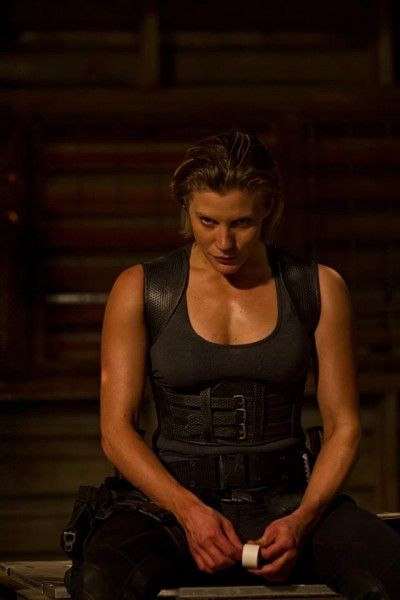
One consistent thread we've got from talking to the cast is, they're really happy there is a lot of development of back story and a lot of character development that's going on, on the set. And I know the production has been very long days, down and dirty shooting. How do you balance having to do the character development on the set? Because I know there’s been a lot of improv on the set and having those kind of demands all the time, I would think that would be very difficult in this kind of production.
TWOHY: It is difficult because we only have 47 days to shoot the movie and we'll probably take 49 or something like that, but that's still tight, maybe the new realities of moviemaking. I shot Pitch Black in 60 or 65 days. I shot Chronicles in 85 days, so here we are a shorter time period than any of it and yet I still have to stay open to — and any good director should stay open to — new possibilities that arrive on the set, on the day or in the moment. If you shut down completely and just shoot the script as I sometimes just want to do because it's the most efficient way to get through it, I shut myself down to happy coincidences and I shut myself down to other ideas. So, I am pretty embracing of actors contributing to not only their back story, but maybe the way a line falls on a given day. But I am also keeping one eye on the clock and realizing that I've got a finite amount of time to shoot this movie and we got to go.
Circling back to digital and where that meets schedule — you mentioned 60, 65 days for Pitch Black — do you think with the Arri Alexa, you can keep rolling, do you feel like it accelerates your schedule?
TWOHY: Yeah, it is helpful. Nothing kills you more than the reload because you got ten minutes on a mag and that's it, reload. And then some guy sitting there with his little fingers and it's downtime. Then the actors hear “Reload!” That means okay, I'm headed to the bathroom or I'm headed to the craft service table or I'm headed to my trailer, sometimes. So yeah, I can actually get — I don't know what we put on the codex mags now, but it feels like, I can let it run.
Could you talk about your education in film? Where did you study?
TWOHY: I went to Long Beach State, started out as an actor. About two years in, they cast me in a student movie. They had an idea, a concept for it, but they didn't have any script for it. They just were putting their plotlines on a chalkboard and they would say things to me like, “Now okay, so your character is going to run into this bar, you steal something, you rob a liquor store, you run into a bar, you're going to meet a hooker there and then you–” And I said, “So what do I say to the hooker?” And they’d go, “We'll figure that out later.” I said, “Do you want me to maybe write some lines for that?” And they said, “Yeah, you write some lines.” And that was actually the first film writing I ever did for like a mismanaged, ill conceived student film, but that got me interested in writing and once I saw what they were doing with the technology of filmmaking, I got interested in that and said, “You know, maybe over in theater arts they probably can't teach me how to be a better actor but I can certainly learn how a camera works and how lenses work.” So, I got more interested in behind the scenes in college and I switched over to film major.
You said Ridley Scott was kind of a mentor. Is there another person whose work you followed or helped you?
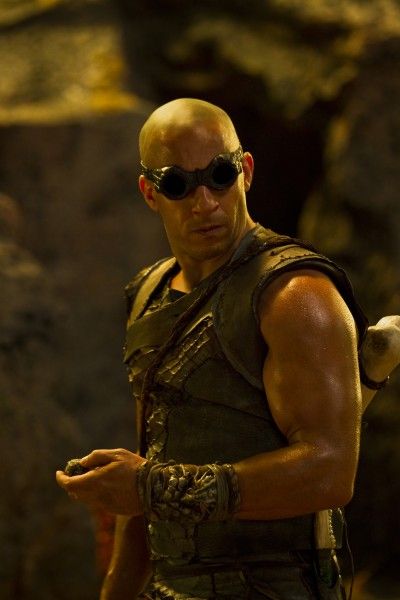 TWOHY: I was a film student in college when both Alien and Aliens — actually Aliens hit and that was a big phenomenon too. It was like you know, Jim Cameron, between Terminator and Aliens, fucking hell yeah.
TWOHY: I was a film student in college when both Alien and Aliens — actually Aliens hit and that was a big phenomenon too. It was like you know, Jim Cameron, between Terminator and Aliens, fucking hell yeah.
Andrew Davis perhaps, you said–
TWOHY: Andy Davis as a mentor? No.
You wrote The Fugitive.
TWOHY: Yeah, but not as a mentor, no. I think he's — well, I won't.
I was just curious.
TWOHY: I saw all those microphones around me, suddenly yeah. Look, I like those guys a lot. I spent a lot of time with Ridley between G.I. Jane and we were going to do another movie together. He asked me to rewrite Omega Man for him — I am Legend — when he was going to do it with Schwarzenegger and I said, “Here is my take on that. I will do it — thinking about Schwarzenegger in the lead role — I will do it, I will write you a script that has no dialogue in it, it is all visual and he took the longest time before he said, “I don't think I can do that to Arnold, I don't think I can go to him and ask him not to speak in a movie,” but I said, “Well think about it, you being the visualist you are, think about that, pure vision.” And then he bounced out because Warner Bros. didn't want to give 105 million dollars to shoot it and then they ultimately spent 150 million dollars to shoot it with — who wound up directing that?
Frank Lawrence.
TWOHY: Who?
Frank Lawrence for I am Legend, Francis Lawrence.
TWOHY: Francis Lawrence, yeah.
Talk a little bit about the casting for this because you've got a really interesting group of people, interesting faces, interesting body types and so forth. What was your thinking in terms of the kind of people you were looking for to play some of these characters? Were these faces you had in your mind based on the script or was it like, when these people started coming in?
TWOHY: It's more the latter and then you start meeting these interesting types and you want to stay open to all races. I mean because look, Vin's production companies is called One Race — that's the tip-off right there that you should be open to anything that walks in the door and any kind of person and any race person. But you get these interesting actors in and then you start putting them up on a wall and you say look at how this guy is, this guy is so different from this guy and if you put Dave Bautista in there he doesn't look like anybody else in the world. Then if you look at the face of Matt Nable who play Boss Johns for us, it's like, there’s pain in that face. There is pain in that face, I love that. Jordi Molla — a great Spanish actor. We just like to really fucking mix it up and when you put it on the board there, finally you go, “That's it, look at all those guys, those are great faces to film and they're good actors.”
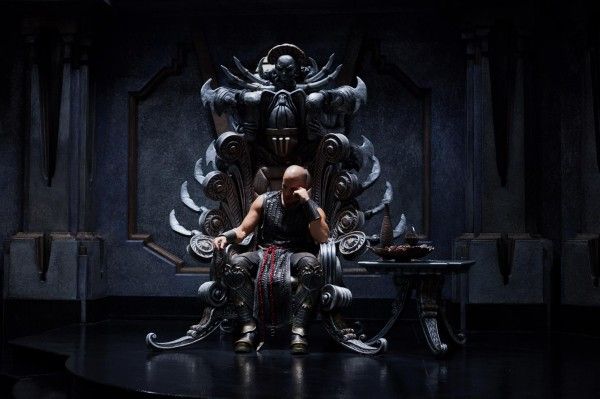
And Katee Sackhoff on top of that.
TWOHY: And Katee Sackhoff, yeah, right in the middle there.
What will Keri Hilson's role be in this film?
TWOHY: She plays a prisoner, a convict who arrives with the mercenaries on this planet on which Riddick is stranded and suffers a harsh fate.
Is she done filming already?
TWOHY: She’s done, yeah.
A lot of the actors we talked to mentioned that you had suggested that they could make up their own back story, that the script is fairly well defined and even if it's not 100% static you know it's, but–
TWOHY: Yeah. Not for say, the leads, but by the time you get passed the third or fourth parts and I may have only sketched them out in the script and I say, “Start there. It's not enough to just remain a sketch when we film, come to me with back story and now start defining your own relationships with the other, let's say, mercenaries in your crew.” So if I give them the liberty of that, they go off and they start using their very productive minds and they come back to me and they go, “Okay, I'm the tracker, I'm the sniper, I'm the you know and I'm the number one, I'm the number two, I'm the number three here, we team up together, we team up together.” And they come back with those ideas, we massage them and then we lock them down and that's how we film it. It's very helpful to get the actors thinking for you and so it worked out well in this film.
Is that an approach that you've used in the past?
TWOHY: Yeah, because I can't answer all the questions. I can't do it all, so occasionally I just sketch out a character in the script and say, “Here’s where we're starting but let's not end there, let's go further.”
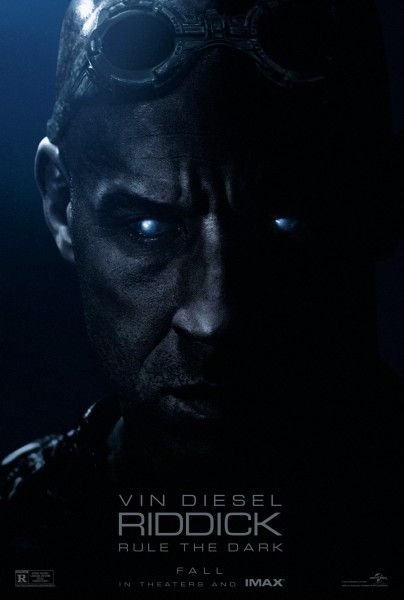
Since you have a smaller budget, how has that made you more creative as a director? Are you doing more practical as opposed to visual?
TWOHY: I would have loved to do more practical. When we shot Pitch Black, we shot a lot of it outside — built a spaceship outside in the outback of Australia. We wanted to do it the same way but we got weathered out, so our weather window — could’ve shot in Canada in the fall, wanted to, had the financial hiccup and that put us into winter in Canada. You can't film outdoors, had to run indoors, had to hang 1,000 feet of green screen, had to add 200 visual effects shots.
What about even with the monsters, the mud worms and that? Are you going more practical?
TWOHY: I am doing that the way I shot Pitch Black so that whenever there is a close proximity to the actors or contact with the actors I have puppet pieces and I keep them moving. I keep it energetic. I know how to light it so that you can get away with the close-ups and then anything that's a medium or wide shot will be CG.
Had you ever considered bringing the original Pitch Black creature back?
TWOHY: No, only because it is a denizen of that planet and not the planet we find ourselves on, and besides, it's not an intelligent creature. I don't like — well no, by the way, if we do that, then we're playing Alien all over again and we want to play Riddick not Alien.
Riddick gets released September 6th. For more from our set visit:
- 40 Things to Know About RIDDICK from Our Set Visit
- 15 New High-Resolution Images from RIDDICK Featuring Vin Diesel, Katee Sackhoff, Dave Bautista, Jordi Molla, and More
- Vin Diesel Talks Finally Getting the Sequel Made, Going "Bare Bones" for Creative Freedom, and More on the Set of RIDDICK
- Katee Sackhoff Talks How BSG Prepared Her for the Role, Iconic Female Sci-Fi Characters, Her Peculiar Casting Process, and More on the Set of RIDDICK
- Production Designer Joseph C. Nemec Talks Changing the Color Palette, Working on a Smaller Budget, His Career, and More on the Set of RIDDICK
 Question: This is a project that Vin [Diesel] has talked about for a long time and you've talked about–
Question: This is a project that Vin [Diesel] has talked about for a long time and you've talked about–
 The entire Chronicles universe encompasses a lot more than just the live action movies. You guys have had the animated films and you've been involved with the video games that were really great. I'm curious, are you planning to do that then with everything moving forward, with this movie and on, are we going to see more games?
The entire Chronicles universe encompasses a lot more than just the live action movies. You guys have had the animated films and you've been involved with the video games that were really great. I'm curious, are you planning to do that then with everything moving forward, with this movie and on, are we going to see more games?
 When you conceived doing Pitch Black for the first time, was this something like, you wanted to make a horror film?
When you conceived doing Pitch Black for the first time, was this something like, you wanted to make a horror film?
 TWOHY: It's an interesting question, maybe a difficult question, in that Riddick is sort of an elemental figure and so the question is, “How much do you want to evolve an elemental figure?” You do want to make discoveries about him and that's what we are slowly doing, as he sort of discovers who he is himself and what it means to be a Furyan. I'll take it up to that point and then you can ask Vin about what it is to be a Furyan.
TWOHY: It's an interesting question, maybe a difficult question, in that Riddick is sort of an elemental figure and so the question is, “How much do you want to evolve an elemental figure?” You do want to make discoveries about him and that's what we are slowly doing, as he sort of discovers who he is himself and what it means to be a Furyan. I'll take it up to that point and then you can ask Vin about what it is to be a Furyan.
 TWOHY: The answer is yes and we talked about making the next movie, blowing the next movie out a bit and really going for it and making it the battle of Underverse and just really fucking going crazy with it. It would demand more — this movie would have to be successful. It would demand a greater budget, but that's a distinct possibility for movie number four. So yes, the idea that you can go from a small movie to a large movie to a small movie and then let the fans decide whether, “You know what? I like one, three and five better than two and four,” “Are you kidding me? I like the sweep of two and four.” We actually like that and we can't think of another franchise that will do that, sort of talk about okay, this is one of their more intimate films, here is a big blow out film. We kind of like that duplicity.
TWOHY: The answer is yes and we talked about making the next movie, blowing the next movie out a bit and really going for it and making it the battle of Underverse and just really fucking going crazy with it. It would demand more — this movie would have to be successful. It would demand a greater budget, but that's a distinct possibility for movie number four. So yes, the idea that you can go from a small movie to a large movie to a small movie and then let the fans decide whether, “You know what? I like one, three and five better than two and four,” “Are you kidding me? I like the sweep of two and four.” We actually like that and we can't think of another franchise that will do that, sort of talk about okay, this is one of their more intimate films, here is a big blow out film. We kind of like that duplicity.
 One consistent thread we've got from talking to the cast is, they're really happy there is a lot of development of back story and a lot of character development that's going on, on the set. And I know the production has been very long days, down and dirty shooting. How do you balance having to do the character development on the set? Because I know there’s been a lot of improv on the set and having those kind of demands all the time, I would think that would be very difficult in this kind of production.
One consistent thread we've got from talking to the cast is, they're really happy there is a lot of development of back story and a lot of character development that's going on, on the set. And I know the production has been very long days, down and dirty shooting. How do you balance having to do the character development on the set? Because I know there’s been a lot of improv on the set and having those kind of demands all the time, I would think that would be very difficult in this kind of production.
 TWOHY: I was a film student in college when both Alien and Aliens — actually Aliens hit and that was a big phenomenon too. It was like you know, Jim Cameron, between Terminator and Aliens, fucking hell yeah.
TWOHY: I was a film student in college when both Alien and Aliens — actually Aliens hit and that was a big phenomenon too. It was like you know, Jim Cameron, between Terminator and Aliens, fucking hell yeah.
 Since you have a smaller budget, how has that made you more creative as a director? Are you doing more practical as opposed to visual?
Since you have a smaller budget, how has that made you more creative as a director? Are you doing more practical as opposed to visual?



